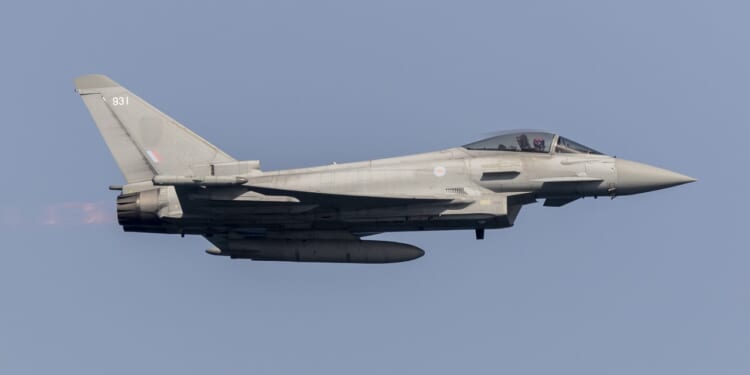The Eurofighter Typhoon is a joint project among Germany, Italy, Spain, and the UK.
The United Kingdom has decided to sell 20 Eurofighter Typhoon fighter jets to Turkey.
Valued at £8 billion (approximately $10.6 billion), the deal offers Turkey a much-needed fighter jet capability.
British Eurofighter Typhoons for Turkey
“A really good day for the United Kingdom. A really good day for jobs,” British prime minister Keir Starmer said from Turkey. “So, today we are signing a really big deal with Turkey for the provision of [Eurofighter] Typhoons, 20 Typhoons.”
Turkish president Tayyip Erdogan has been on the market for a new fighter jet for years. For the Eurofighter Typhoon specifically, Turkey has tried to buy from Germany and Qatar. The deal with Germany for 40 fighter jets stalled over the final price. The deal with Qatar for around 24 used fighter jets seems to be gaining momentum. The Eurofighters bought from the UK will be brand new.
“This is the biggest fighter jet deal in 20 years,” British minister for defence readiness and industry Luke Pollard stated.
The Eurofighter Typhoon is a joint project among Germany, Italy, Spain, and the UK. Any transfer of aircraft would need the approval of all four members of the program.
However, the British-made fighter jets will not join the Turkish Air Force for some years, further straining its current capabilities.
Turkey, the United States, and NATO
Although a NATO member state, Turkey has alienated many of its fellow NATO states over its close ties to Russia, Iran, and even terrorist organizations, such as Hamas. Moreover, Turkey has facilitated an immigration crisis in Europe by allowing migrants to use its territory to enter the continent.
Ankara has been searching for a new fighter jet platform since it realized that the F-35 Lightning II option was not available to it. Turkey was part of the Joint Strike Fighter program, which now includes 20 countries. However, in 2017, Ankara decided to purchase the S-400 Triumph air defense system from Russia. Russia is a competitor of NATO—if not an adversary. Thus, the purchase of the S-400 made the acquisition of the F-35 by Turkey impossible. With both systems operational, the Russians would be able to gather important information about the stealth fighter’s classified technology. Ankara has repeatedly tried to reverse the United States’ decision not to sell the F-35, but it has found little success.
In addition to the S-400 and F-35 debacle, Turkey has further distanced itself from NATO by getting closer to Russia. For example, when Sweden and Finland decided to abandon decades of neutrality and join NATO following Russia’s large-scale invasion of Ukraine, Turkey (and to a lesser extent, Hungary) erected a roadblock. A country can only enter NATO if all the member states vote “yes.” Thus, Turkey’s recalcitrance delayed the joining of the two Scandinavian countries to the transatlantic alliance for several months.
London’s willingness to sell 20 Eurofighter Typhoons to Turkey in exchange for around $10.6 billion will allow the Turkish Air Force to remain competitive after years of neglect and purges following the unsuccessful coup d’etat against Erdogan in 2016.
About the Author: Stavros Atlamazoglou
Stavros Atlamazoglou is a seasoned defense journalist specializing in special operations and a Hellenic Army veteran (national service with the 575th Marine Battalion and Army HQ). He holds a BA from the Johns Hopkins University and an MA from the Johns Hopkins’ School of Advanced International Studies (SAIS). His work has been featured in Business Insider, Sandboxx, and SOFREP.
Image: Wirestock Creators / Shutterstock.com















